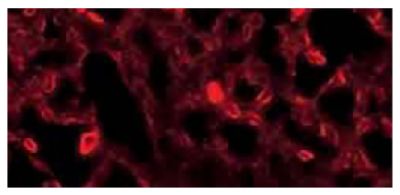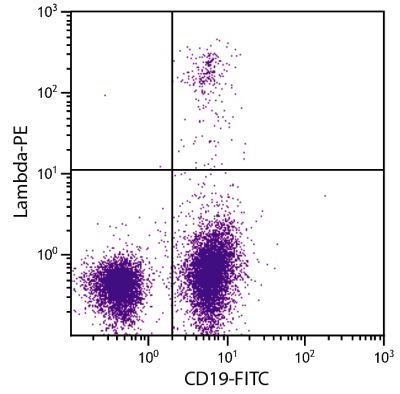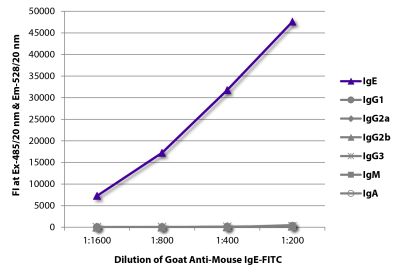Goat F(ab')2 Anti-Mouse IgG1, Human ads-AF488
Cat. No.:
1072-30
Goat F(ab')2 Anti-Mouse IgG1-Alexa Fluor® 488 antibody with minimal reactivity to human proteins for use in flow cytometry and immunohistochemistry / immunocytochemistry assays.
$317.00
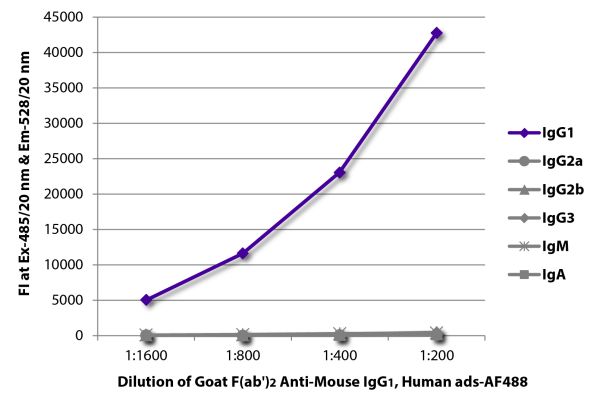


| Isotype | Goat F(ab')2 IgG |
|---|---|
| Isotype Control | 0110-30 |
| Specificity | Reacts with the heavy chain of mouse IgG1 |
| Source | Pepsin digest of Goat Anti-Mouse IgG1, Human ads (SB Cat. No. 1070) |
| Cross Adsorption | Mouse IgG2a, IgG2b, IgG3, IgM, and IgA; human immunoglobulins and pooled sera; may react with immunoglobulins from other species |
| Conjugate | AF488 (Alexa Fluor® 488) |
| Buffer Formulation | Phosphate buffered saline containing < 0.1% sodium azide |
| Clonality | Polyclonal |
| Concentration | 0.5 mg/mL |
| Volume | 1.0 mL |
| Recommended Storage | 2-8°C; Avoid exposure to light |
| Trademark Information | Alexa Fluor® is a registered trademark of Thermo Fisher Scientific, Inc. or its subsidiaries |
| Applications |
Quality tested applications for relevant formats include - ELISA FLISA Flow Cytometry 1-15 Other referenced applications for relevant formats include - Immunohistochemistry-Frozen Sections 16 Immunohistochemistry-Paraffin Sections 17 Immunocytochemistry 3,18 |
| RRID Number | AB_2794435 |
| Gene ID |
16017 (Mouse) |
| Gene ID Symbol |
Ighg1 (Mouse) |
| Gene ID Aliases | IgG1; Igh-4; VH7183 |
| UniProt ID |
P01868 (Mouse) P01869 (Mouse) |
| UniProt Name |
IGHG1_MOUSE (Mouse) IGH1M_MOUSE (Mouse) |
Documentation
Certificate of Analysis Lookup
Enter the Catalog Number and Lot Number for the Certificate of Analysis you wish to view
- 1. Lovchik JA, Wilder JA, Huffnagle GB, Riblet R, Lyons CR, Lipscomb MF. Ig heavy chain complex-linked genes influence the immune response in a murine cryptococcal infection. J Immunol. 1999;163:3907-13. (FC)
- 2. Kirveskari J, Bono P, Granfors K, Leirisalo-Repo M, Jalkanen S, Salmi M. Expression of α4-integrins on human neutrophils. J Leukoc Biol. 2000;68:243-50. (FC)
- 3. Albrecht B, Woisetschläger M, Robertson MW. Export of the high affinity IgE receptor from the endoplasmic reticulum depends on a glycosylation-mediated quality control mechanism. J Immunol. 2000;165:5686-94. (FC, ICC)
- 4. Stabel TJ, Bolin SR, Pesch BA, Rahner TE. A simple and rapid flow cytometric method for detection of porcine cell surface markers. J Immunol Methods. 2000;245:147-52. (FC)
- 5. Luby TM, Schrader CE, Stavnezer J, Selsing E. The μ switch region tandem repeats are important, but not required, for antibody class switch recombination. J Exp Med. 2001;193:159-68. (FC)
- 6. Gelderman KA, Blok VT, Fleuren GJ, Gorter A. The inhibitory effect of CD46, CD55, and CD59 on complement activation after immunotherapeutic treatment of cervical carcinoma cells with monoclonal antibodies or bispecific monoclonal antibodies. Lab Invest. 2002;82:483-93. (FC)
- 7. Meurens F, Whale J, Brownlie R, Dybvig T, Thompson DR, Gerdts V. Expression of mucosal chemokines TECK/CCL25 and MEC/CCL28 during fetal development of the ovine mucosal immune system. Immunology. 2007;120:544-55. (FC)
- 8. Dierssen JW, de Miranda NF, Mulder A, van Puijenbroek M, Verduyn W, Claas FH, et al. High-resolution analysis of HLA class I alterations in colorectal cancer. BMC Cancer. 2006;6:233. (FC)
- 9. Guikema JE, Linehan EK, Tsuchimoto D, Nakabeppu Y, Strauss PR, Stavnezer J, et al. APE1- and APE2-dependent DNA breaks in immunoglobulin class switch recombination. J Exp Med. 2007;204:3017-26. (FC)
- 10. Corver WE, Middeldorp A, ter Haar NT, Jordanova ES, van Puijenbroek M, van Eijk R, et al. Genome-wide allelic state analysis on flow-sorted tumor fractions provides an accurate measure of chromosomal aberrations. Cancer Res. 2008;68:10333-40. (FC)
- 11. Guikema JE, Schrader CE, Leus NG, Ucher A, Linehan EK, Werling U, et al. Reassessment of the role of Mut S homolog 5 in Ig class switch recombination shows lack of involvement in cis- and trans-switching. J Immunol. 2008;181:8450-9. (FC)
- 12. Guikema JE, Schrader CE, Brodsky MH, Linehan EK, Richards A, El Falaky N, et al. p53 represses class switch recombination to IgG2a through its antioxidant function. J Immunol. 2010;184:6177-87. (FC)
- 13. Verloes A, Van de Velde H, LeMaoult J, Mateizel I, Cauffman G, Horn PA, et al. HLA-G expression in human embryonic stem cells and preimplantation embryos. J Immunol. 2011;186:2663-71. (FC)
- 14. Prigione I, Penco F, Martini A, Gattorno M, Pistoia V, Morandi F. HLA-G and HLA-E in patients with juvenile idiopathic arthritis. Rheumatology. 2011;50:966-72. (FC)
- 15. Mackenzie-Dyck S, Kovacs-Nolan J, Snider M, Babiuk LA, van Drunen Littel-van den Hurk S. Inclusion of the bovine neutrophil Beta-defensin 3 with glycoprotein d of bovine herpesvirus 1 in a DNA vaccine modulates immune responses of mice and cattle. Clin Vaccine Immunol. 2014;21:463-77. (FC)
- 16. Tanaka M, Nagai T, Tsuneyoshi Y, Sunahara N, Matsuda T, Nakamura T, et al. Expansion of a unique macrophage subset in rheumatoid arthritis synovial lining layer. Clin Exp Immunol. 2008;154:38-47. (IHC-FS)
- 17. Kanaya T, Aso H, Miyazawa K, Kido T, Minashima T, Watanabe K, et al. Staining patterns for actin and villin distinguish M cells in bovine follicle-associated epithelium. Res Vet Sci. 2007;82:141-9. (IHC-PS)
- 18. Peng SL, Moslehi J, Craft J. Roles of interferon-γ and interleukin-4 in murine lupus. J Clin Invest. 1997;99:1936-46. (ICC)
See More


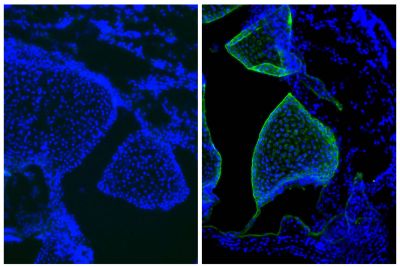
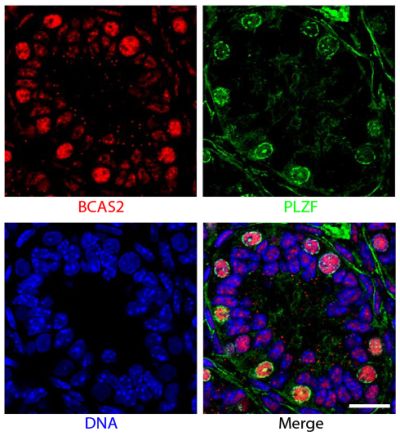
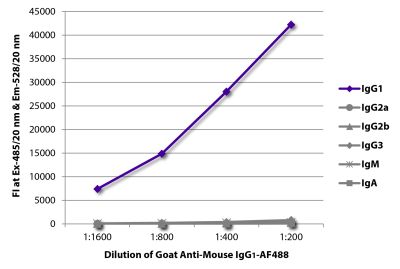
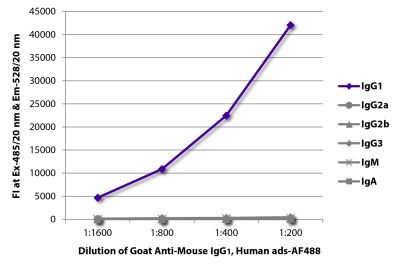
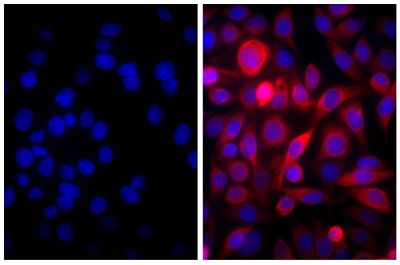
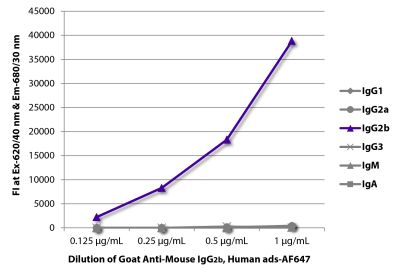
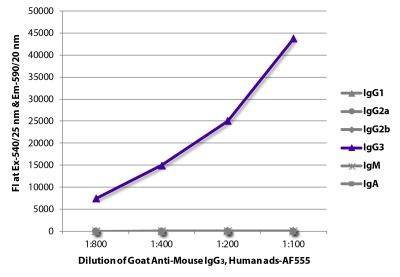
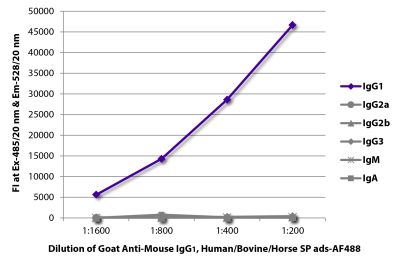
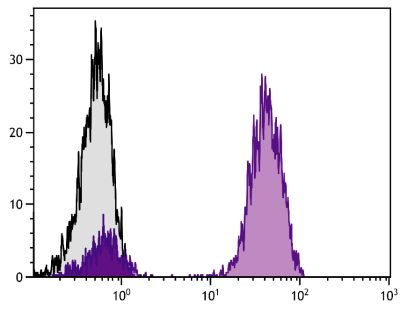
![Wdpks1Δ-1 yeast cells treated with liquid nitrogen were stained with anti-melanin followed by Goat Anti-Mouse IgM, Human ads-TRITC (SB Cat. No. 1020-03).<br/>Image from Paolo WF Jr, Dadachova E, Mandal P, Casadevall A, Szaniszlo PJ, Nosanchuk JD. Effects of disrupting the polyketide synthase gene <i>WdPKS1</i> in <i>Wangiella</i> [<i>Exophiala</i>] <i>dermatitidis</i> on melanin production and resistance to killing by antifungal compounds, enzymatic degradation, and extremes in temperature. BMC Microbiol. 2006;6:55. Figure 5(d)<br/>Reproduced under the Creative Commons license https://creativecommons.org/licenses/by/2.0/](https://www.southernbiotech.com/media/catalog/product/cache/3409635b2d8a6f8a49dab513db4d1386/e/1/e1bdcbb171112075fbda9bda20f45e7e878c207c8caf1773ba0e0bf58185d151.jpeg)
